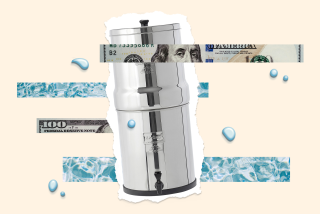Just Call Him the Green Marketeer : Jim Whittaker Scaled Mt. Everest; Now He’s Tackling the Environment
- Share via
The first U.S. climber to conquer Mt. Everest now aspires to be the Fuller Brush man of environmentalism.
Jim Whittaker, who climbed the Himalayan peak in 1963, has launched a direct-sales company to market environmentally benign household products.
More than 800 part-time environmentalists/entrepreneurs in Oregon and Washington already preach preservation while they sell cleansers, soaps and toilet paper through Greenway, Whittaker’s 2-year-old firm.
His next target market: California.
Whittaker set up Greenway, he says, because “a lot of environmental products were sitting on supermarket shelves, if they got there at all.” Yet he was certain that consumer interest was booming.
Indeed, this year almost 16% of U.S. cleaning preparations--$5 billion out of a $31-billion market--will be bought by consumers because they think they are environmentally sensitive, according to Carl Frankel, editor of the Green MarketAlert newsletter.
And a 1992 study by Environmental Research Associates of Princeton, N.J., found that 51% of consumers look at labels to see if products claim to be environmentally correct, up from 32% in 1990.
Whittaker blamed the lackluster sales of “deep green” products--the lesser-known brands that go furthest to meet environmentalists’ standards--on the premium prices that consumers typically are asked to pay.
“The Sierra Club and the bark biters will pay a little more, but not the blue-collar workers,” Whittaker genially observes. “Prices have to be as good or better than grocery store prices, on a per-use basis, even with moderately priced items.”
Greenway markets a line of laundry and kitchen soaps, bath gels and shampoos based on grapefruit seed extract and other non-toxic substances. To conserve packaging, the products are sold in highly concentrated form, which Whittaker says brings the price per use to roughly equal that of name-brand cleaners. (A 32-ounce bottle of Greenway’s all-purpose Green Garden Soap, at $6.95, gives about the same washing performance as two 64-ounce bottles of Cheer at $2.99 each, Whittaker says.)
Whittaker and his wife, Dianne Roberts, launched Greenway in Port Townsend, Wash., in 1991, converting their home laundry room into the first office.
Today the company boasts a management team and a board that includes Robert Frick, a retired vice chairman of BankAmerica, and Pat Nelson, former vice president of sales for Discovery Toys Inc., an $80-million marketer of educational toys and books.
No novice businessman himself, Whittaker is former president and chief executive of Recreational Equipment Inc., or REI, the largest U.S. consumer cooperative, with 35 retail outlets in California and 17 other states. REI, which was founded in 1938, had $80,000 in annual sales in 1955, when Whittaker became general manager. In 1979, when he retired, sales had reached $46 million. In 1992, they topped $300 million.
Whittaker’s environmental credentials are equally strong. Leading the 1990 Mt. Everest Earth Day International Peace Climb, he, Roberts and a crew of Russian, American and Chinese climbers hauled two tons of trash off the world’s highest mountain.
And it was largely environmental concerns that brought him to the sometimes tainted marketing technique called multilevel direct sales--the mechanism used by Fuller Brush Co., Avon Products Inc., Amway Corp., Mary Kay Cosmetics and other companies.
Products sold by one-to-one contacts through a network of distributors can cost less to package and nothing to advertise. And there is less of the overhead associated with catalogue or retail sales.
The dark side of the business has been those ventures that cross the line to become pyramid schemes, which are illegal under most state consumer-protection laws. Such schemes funnel most of the profit to top executives through a widening pyramid that generates more money from fees to buy distributorships than from sale of the company’s products. In the end, as with a chain letter, distributors at the bottom invest money they can’t hope to recover from their own sales.
Greenway offers incentives for distributors to bring in other converts, but only within what consumer officials say are legal bounds. And instead of instant riches, the firm promises distributors the low-key opportunity to make “extra money.”
Besides Greenway, just two other U.S. companies survive in the fledgling $8-million-a-year market for environmental direct sales: Stamford, Conn.-based Natural World Inc. and Impact/Gentle Earth, a small company based in Dallas.
But the ebullient Greenway team expects Greenway’s sales to reach $1 million a year by 1994, which would move the company into profitability.
The ‘Deep Green’ Market
“Deep green” products are those “whose core identities are build around their claimed environmental assets,” according to one market analyst. Sales are expected to rise seasdily.
Projected Sales of Deep Green Household Cleaning Products
(in millions of dollars)
1993 1994 1995 1996 1997 1998 $75 $87 $100 $120 $140 $165
Source: Green MarketAlert
More to Read
Inside the business of entertainment
The Wide Shot brings you news, analysis and insights on everything from streaming wars to production — and what it all means for the future.
You may occasionally receive promotional content from the Los Angeles Times.










